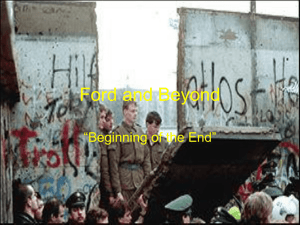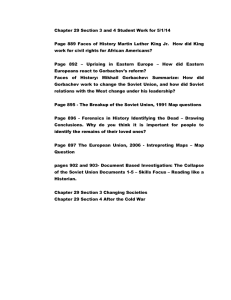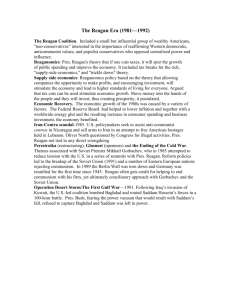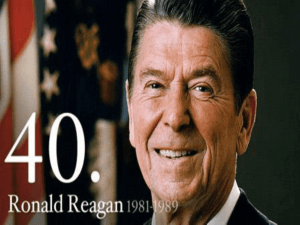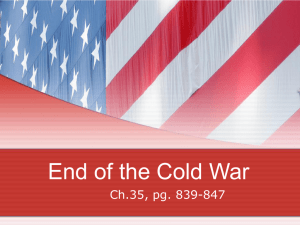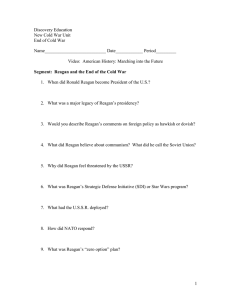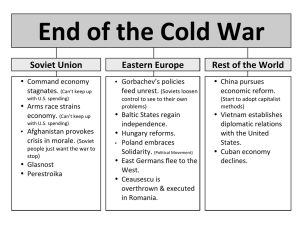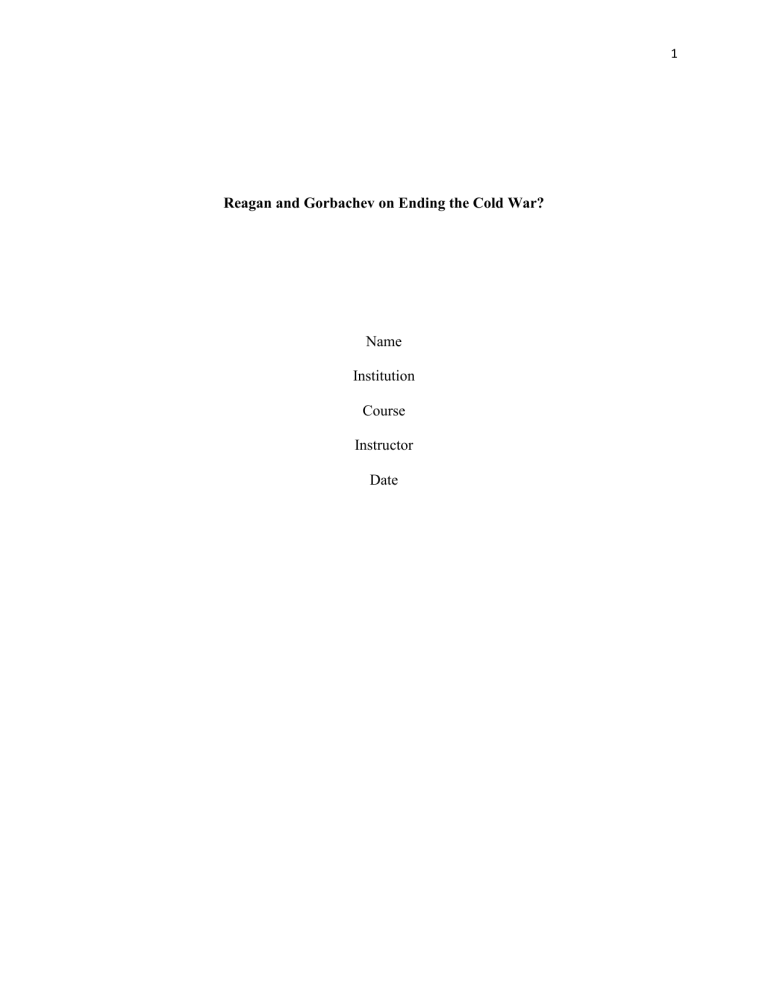
1 Reagan and Gorbachev on Ending the Cold War? Name Institution Course Instructor Date 2 Reagan and Gorbachev on Ending the Cold War? The United States and the Soviet Union had a fraught and adversarial relationship throughout the Cold War. Originating after World War II and culminating with the fall of the Soviet Union in 1991, both nations harbored deep-seated fear and suspicion of each other, each believing that the other posed a potential threat capable of triggering a catastrophic global conflict. The possession of formidable nuclear weapons further heightened these anxieties. Throughout the 1970s and 1980s, an arms race ensued as both superpowers sought to develop increasingly advanced and powerful weaponry, intensifying global apprehension (Malici, 2006). However, amidst these alarming circumstances, two leaders, Ronald Reagan and Mikhail Gorbachev, emerged and collaborated to promote peace. By means of discourse, deliberate planning, and shared dedication to disarmament, they instigated significant alterations that would revolutionize the globe. An effective leader ought to endeavor to alter the course of their nation, enhancing its well-being and promoting its economic development. Competent leadership has the ability to inspire and equip individuals to face obstacles, advance, and instigate enduring transformations. Effective engagement and agreement forging with others necessitate possessing a lucid vision, exhibiting courage, honesty, and adept communication skills. Effective leadership necessitates adaptability, the ability to make difficult decisions, and the capacity to discern the critical challenges confronting their country. Ronald Reagan and Mikhail Gorbachev effectively terminated the prolonged and hazardous Cold War, which had persisted for a considerable duration (Matlock, 2004). Collectively, they initiated a collaborative endeavor to tackle their mutual issues, involving themselves in discussions that promoted reliance, settled disputes, and 3 pursued harmony. Their leadership not only contributed to global security but also substantially decreased the probability of a catastrophic nuclear conflict. Ronald Reagan, who is widely acknowledged as a prominent leader, played a critical role in the end of the Cold War. The author asserts that the strategic initiatives implemented by the individual in question served to increase the power of the United States of America through the provision of steadfast backing to its armed forces and prioritization of defense capabilities. It is noteworthy that the Soviet Union and the United States did not participate in a direct military confrontation. Conversely, the Soviet Union, under a sense of obligation to react, opted for a comparable course of action, resulting in a burden on its economy and ultimately leading to its collapse. An outstanding feature of Reagan's defense strategy was the execution of the "Strategic Defense Initiative" (SDI), locally known as "Star Wars" (Fitzgerald, 2001). The aforementioned endeavor was geared towards the advancement of missile defense systems, thereby eliciting unease and trepidation within the Soviet Union, who harbored concerns that the United States would attain a technological edge. In the meantime, Mikhail Gorbachev, head of the Soviet Union, made efforts to ameliorate the circumstances by bestowing more autonomy and sovereignty upon his nation (Matlock, 2004). Additionally, he made diligent endeavors to improve diplomatic ties with the United States. The resolution of the Cold War was facilitated by the efforts of both Reagan and Gorbachev, who applied pressure on the Soviet Union and implemented reforms that promoted trust and restored cordial relations. The Cold War presented a formidable and noteworthy obstacle for both the Soviet Union and the United States. The primary objectives of the parties involved centered on attaining dominance, authority, and enhancing their armaments to surpass their opponent. Despite the increasing tensions, Ronald Reagan and Mikhail Gorbachev acknowledged the pressing 4 necessity of preventing a catastrophic nuclear conflict. Through a concerted collaboration, the individuals involved initiated a process of constructive communication and joint effort, recognizing the critical significance of cultivating mutual reliance and promoting harmonious interactions. The INF Treaty was officially signed on December 8, 1987, marking the successful culmination of their collaborative endeavors (MIKLOSH & DJUROV, 2020). The aforementioned pivotal accord pertained to the elimination of exceedingly perilous ballistic missiles that presented a grave menace. The act of disposing of said weaponry resulted in a notable reduction in the probability of employment of nuclear arms between the two dominant global powers (Fitzgerald, 2001). Furthermore, the two leaders pledged to decrease their individual stockpiles by employing alternative methods, thereby making a greater contribution to the overall process of disarmament. Reagan and Gorbachev encountered resistance from conservative factions within their respective governments prior to successfully establishing productive cooperation. Reagan faced opposition as a result of his portrayal of the Soviet Union as the "malevolent empire" and his implementation of intermediate-range armaments in Europe, which sparked demonstrations (Matlock, 2004). In a comparable vein, conservative factions within the Soviet Union articulated dissent towards Gorbachev's reform initiatives and held reservations regarding the impact of Western ideals. Notwithstanding the initial difficulties, Reagan and Gorbachev demonstrated a disposition to collaborate and surmounted these hindrances to formulate efficacious tactics for terminating the Cold War. 5 It is noteworthy that the attainment of such a degree of collaboration necessitated a significant amount of diplomatic endeavor and establishment of trust. Reagan's adeptness in effectively communicating and articulating his ideas garnered him widespread support both domestically and internationally. The notion of a global community devoid of nuclear armaments struck a chord with a multitude of individuals, including Gorbachev. The leaders' readiness to participate in constructive conversation and negotiate with sincerity ultimately facilitated increased confidence between the dominant nations, lessening strains and establishing a more favorable atmosphere for candid deliberations on the reduction of armaments. Gorbachev's contribution in the transformation of the USSR and fostering a sense of accountability among its populace was significant. Upon commencing discussions with Reagan and other leaders from the Western world, the level of trust between the two superpowers was further augmented while the prevailing tensions were concurrently reduced. The enduring influence of Reagan and Gorbachev's leadership is evident in contemporary times. The Comprehensive Test Ban Treaty (CTBT), the Intermediate-Range Nuclear Forces Treaty (INF Treaty), and the Strategic Arms Reduction Treaty (START) were pivotal accords that necessitated bilateral collaboration. The aforementioned treaties have had a noteworthy impact on mitigating the risk of nuclear warfare and reinforcing regulatory protocols. The Cold War has imparted valuable insights that continue to hold relevance in contemporary times, underscoring the significance of communication, cooperation, and collective effort in attaining harmony and advancement within a country. The escalation of the Arms Race between the Soviet Union and the United States throughout the 1970s- 1980s led to significant increases in military expenditures and the 6 development of advanced technologies. Nevertheless, it exacerbated worldwide insecurity and instability. Reagan and Gorbachev engaged in negotiations aimed to reduce the quantity of weapons, however, the conclusion of the Cold War had significant and extensive implications for global affairs. Significantly, it enabled the reintegration of Germany and the expansion of the European Union, resulting in amplified economic and political cohesion throughout the region. In conclusion, the leadership of both Reagan and Gorbachev proved quite instrumental in ending the Cold War and promoting a more secure international landscape. The steadfast dedication to communication and disarmament by the concerned parties resulted in a noteworthy decrease in the likelihood of a nuclear confrontation, and simultaneously facilitated substantial advancements in the realm of global diplomacy. Acknowledging the significance of cooperation, Reagan and Gorbachev collaborated in a concerted effort to mitigate tensions and foster confidence between their respective countries. The collaborative endeavors of Reagan and Gorbachev resulted in a nonviolent resolution to the Cold War, signifying the commencement of a fresh epoch in the diplomatic ties between the United States and the Soviet Union. In addition, the ratification of consequential treaties such as the Intermediate-Range Nuclear Forces Treaty (INF), Strategic Arms Reduction Treaty (START), and Comprehensive Nuclear-Test-Ban Treaty (CTBT) resulted in a noteworthy reduction in the quantity of nuclear armaments possessed by each nation. The aforementioned milestones served as a manifestation of their mutual dedication to the regulation of arms and prevention of proliferation, thereby strengthening the worldwide security framework. It is noteworthy that the insights derived from the Cold War persist in influencing our comprehension of favorable global interactions. Nonetheless, there remains a significant amount of advancement to be achieved in promoting increased collaboration and reciprocal comprehension among countries. The persistent development of these teachings 7 highlights the imperative for sustained endeavors to fortify diplomatic relations and foster cooperation at an international level. 8 References Davis, L. E. (2015). The Cold War Begins. In The Cold War Begins. Princeton University Press. Fitzgerald, F. (2001). Way out there in the blue: Reagan, Star Wars and the end of the Cold War. Simon and Schuster. Malici, A. (2006). Reagan and Gorbachev: Altercasting at the end of the Cold War. Beliefs and leadership in world politics: Methods and applications of operational code analysis, 127149. Matlock, J. (2004). Reagan and Gorbachev: How the cold war ended. Random House. MIKLOSH, B., & DJUROV, L. (2020). THE INF TREATY-CROSSROADS OF INTERNATIONAL NUCLEAR STABILITY. CONTEMPORARY MACEDONIAN DEFENCE.
